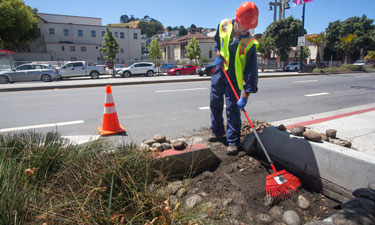 A new national certification program for those who work in the construction, inspection and maintenance of green infrastructure stormwater management may offer a new range of training and educational opportunities, as well as new paths for career development for park maintenance workers and individuals entering the field of parks and recreation.
A new national certification program for those who work in the construction, inspection and maintenance of green infrastructure stormwater management may offer a new range of training and educational opportunities, as well as new paths for career development for park maintenance workers and individuals entering the field of parks and recreation.
Managing Stormwater
The management of stormwater has become a significant challenge for many cities and urban areas. Traditional stormwater management techniques, often referred to as “gray infrastructure,” rely on channels, pipes and culverts to collect and move stormwater runoff. This gray infrastructure is aging and deteriorating in most urban areas and no longer protects water bodies from pollution. And, even though cities are spending hundreds of millions of dollars annually to repair failing water infrastructure and separate combined stormwater and sewer systems, hundreds of cites are in violation of requirements of the Clean Water Act to repair or replace failing stormwater infrastructure.
Utilizing “green infrastructure,” which relies on the processes of nature and natural systems to treat stormwater, is a relatively new approach to stormwater management. Green infrastructure is proving to be highly successful in mitigating water pollution and reducing the costs to treat stormwater runoff, among other benefits.
Parks Are Uniquely Suited to Green Stormwater Management
Green infrastructure stormwater management in parks is an idea whose time has come. Parks are located centrally in urban areas, they are permanently in protected conservation status, and they contain the natural systems that can treat and filter stormwater. Park agencies across the country are looking at how they might install smaller-scale green infrastructure projects on their own and how they might partner with water utilities, public works departments and nonprofit organizations to implement larger-scale green infrastructure solutions to stormwater management in and around parks.
NRPA, through a generous grant from The JPB Foundation, is pioneering new approaches to how green infrastructure in parks can produce triple bottom-line benefits through the Great Urban Parks Campaign, a partnership initiative of NRPA and the American Planning Association that is focused on developing cutting-edge innovations and new evidence-based models of practice for urban parks. NRPA seeks to demonstrate how green infrastructure in parks can go well beyond providing just the functional benefits of stormwater management and additionally provide social equity, economic and environmental benefits to underserved communities.
NRPA has awarded four grants to nonprofit partners working with park and recreation agencies in Atlanta, Baltimore, Denver and Pittsburgh. These upcoming green infrastructure projects, which require community engagement and empowerment as essential components, are already demonstrating success.
One way that green infrastructure project sponsors can tangibly engage their communities is by employing young adults who live nearby project construction sites. The Great Urban Parks Campaign projects are showing that there is excellent potential to create new jobs in the construction, inspection and ongoing maintenance of green infrastructure projects.
National Green Infrastructure Certification Program
DC Water, the public water utility of Washington, D.C., in cooperation with the Water Environment Federation (WEF), the national nonprofit for water professionals, has initiated a new program that will enhance prospects for green infrastructure workers. DC Water and WEF have been working to create the National Green Infrastructure Certification Program (NGICP), which will provide classroom training, interactive learning experiences and field site visits in a 30- to 40-hour course that will award a certificate to workers who successfully complete the training. The first certifications are expected in early 2017.
A number of water utilities around the country are already working on developing NGICP content, including the Milwaukee Metropolitan Sewerage District, San Francisco Public Utilities Commission, the Metropolitan Water Reclamation District of Greater Chicago and about 10 other partners.
Stacy Passaro, the program manager of NGICP, says that the certification will appeal to two types of workers — those who are already employed in parks, grounds maintenance, landscaping and water and sewer construction, and entry-level workers who cities are seeking to employ from employment-challenged communities.
Passaro says there will be many benefits for workers who obtain such certification. “You will become more valuable to your employer,” she said. “This certification shows that you have training and skill in how to maintain new types of stormwater management installations.” She emphasized that workers who have understanding, knowledge and certification will find more job opportunities. “Such workers will be more valuable to city governments, contractors, water utilities and park agencies,” Passaro says. She also noted that the NGICP certification is portable — if workers move to a new job or a new city, their certification goes with them.
An Opportunity for Parks?
The opportunity for parks workers seems significant. Jobs for the Future (JFF), a national nonprofit working with NatureWORKS, is conducting a national research project to survey the occupations and potential for workforce development in green infrastructure in both the public and private sector. Not only are park and recreation workers already well-versed in the techniques and knowledge of how green infrastructure works, but new duties in the construction, inspection and maintenance of green stormwater infrastructure can be easily and naturally incorporated into traditional park maintenance and management work programs.
Richard J. Dolesh is NRPA’s Vice President of Conservation and Parks.

